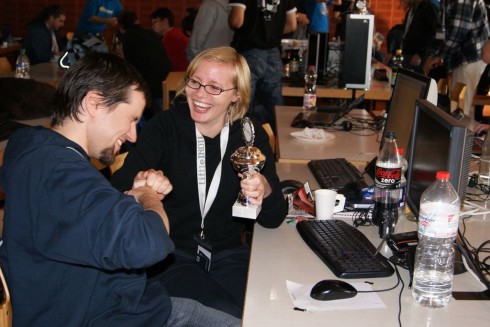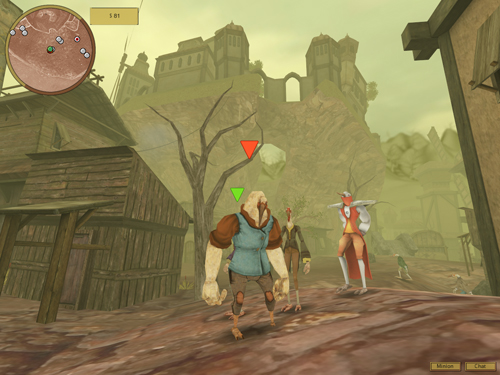Unlike the other content, this article is available in German only. But Google translate might help.

Mein drittes Jahr in Folge bei der Devmania - dem größten und trotzdem kuschligsten Hobbyspielentwicklertreffen Deutschlands. Eigentlich sind es immer die gleichen Gesichter, viele sehr jung, größtenteils männlich, Windows-und Linux-Desktop-PCs und Laptops - sehr nerdig, aber keineswegs unzugänglich!
Obwohl die meisten irgendeine Entwicklungsumgebung offen haben und an ihren aktuellen Spielen herumbasteln, sind alle hier, um ihre Arbeiten zu zeigen, darüber zu diskutieren oder einfach neue Leute kennen zu lernen. Viele kommen - wie wir auch - gleich im Pulk, am besten einheitlich als Team gekleidet oder mit Teamtischdecke. Die große Mehrheit ist dabei sicher Programmierer, aber ich hab mich auch sehr über das Mädchen mit den Aquarellfarben oder den Musiker mit dickem Keyboard gefreut.
Zur Eröffnung kam ich bisher leider immer zu spät - dank 5h-Fahrt durch 4 Bundesländer. Ankommen, PC unter den vorbereiteten Tisch packen und dann hören wir meistens einer Reihe von Vorträgen zu.
Die halten die Teilnehmer selbst, manche auch gleich zwei... Wir haben unseren Teil mit "iOS-Development mit Unity" beigesteuert und Friedrich hat zudem noch seine drei Ludum-Dare-Spiele gezeigt (und dafür den zweiten Platz der Projektvorstellungen bekommen!).
Die waren dieses Jahr allerdings ziemlich brav. Der kreative Größenwahn der deutschen Hobbyspieleentwicklung in Form von MMOs und Gothic-ähnlichen RPGs blieb diesmal (leider) aus. Dafür eher die Präsentation fertiger Projekte oder wie man fertige Projekte durch Struktur in der Konzeptphase erreicht. Eine Engine war wieder dabei (Softpixel), der Splitterweltenmacher Thomas Schulze stellte Splatter vor und Related Design's Christian Rösch zeigte neben der Entwicklung (s)einer Demo auch sein 2D Shoot'em'Up.
Wer kein eigenes Projekt am Laufen hat, erhält die Chance darauf durch die Teilnahme am Overnightcontest. Thema dieses Jahr: Pirates! Von 14 Uhr an bis zum nächsten Morgen um 10 Uhr erreichten elf Projekte den Abgabezustand.
Ich freu mich schon auf nächstes Jahr!!! Der Termin steht auch schon fest: 6./7. Oktober 2012. Dann hoffentlich mit einer großen Projektvorstellung auch von unserer Seite!
Es tut gut zu sehen, was die deutsche (Hobby-)Spieleentwicklung so treibt. Ich weiß noch, wie verdammt pessimistisch ich die deutsche Szene in meiner Diplomarbeit betrachtet habe. Aber gerade erwachsen ihr doch eine ganze Reihe von Talenten.
Bis nächstes Jahr (oder der nächsten Entwicklerveranstaltung)!
Noch zum Schluss: Ein paar interessante Teams und Entwickler, die wir trafen (Ich hoffe, ich vergesse niemanden!)
Iwan Gabovitch | Joyride Labs mit Nikki and the Robots
Thomas Schulze | Splitterwelten und Splatter
Andreas Reich und Martin Dechant | Golden Vertices
Felix Kerger, Torben Wenzel und Manuel Scherer | Uniworlds
Alexander Zacherl | Bit Barons
Thomas Trocha
Frederic Schimmelpfennig | Goose Gogs






